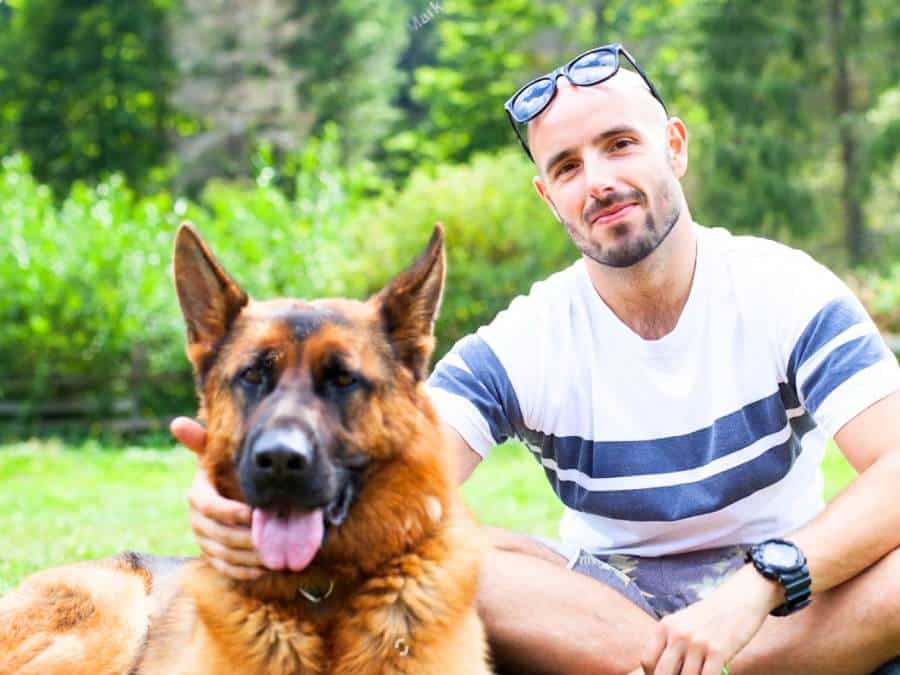Welcoming a German Shepherd into your home can be one of the most rewarding and fulfilling experiences life has to offer.
Beyond the joy of companionship, adopting a German Shepherd from a shelter or a rescue organization brings an unmatched sense of satisfaction, knowing that you’ve provided a loving home for a furry friend in need.
This guide will walk you through the process of adopting a German Shepherd, from understanding your lifestyle and preferences to the places where you can find a GSD to adopt.
We’ll also cover tips on navigating adoption procedures and ensuring a smooth transition for both you and your newfound pet.
Assessing Your Readiness for a Rescue Dog
Assessing your lifestyle before bringing home a German Shepherd is crucial to ensure that you can meet the breed’s needs and provide a happy, healthy, and fulfilling life for your new canine companion. Here are some key factors to consider:
Activity Level
German Shepherds are known for their high energy levels and require regular exercise. Assess your own activity level and make sure you can commit to daily walks, playtime, and mental stimulation.
RELATED: 10 Reasons To Adopt A German Shepherd
Space
German Shepherds are medium to large-sized dogs that need space to move around. If you live in a small apartment, make sure you have nearby parks or open spaces for exercise. A house with a fenced yard is ideal.
Time Commitment
German Shepherds are intelligent and require mental stimulation. Training, playtime, and socialization are essential. Assess your daily schedule to ensure you have enough time to spend with your dog.

Training Abilities
German Shepherds are highly trainable but require consistent and positive training methods. Consider your experience with dog training or your willingness to attend training classes.
Financial Commitment
Owning a dog comes with financial responsibilities, including veterinary care, food, grooming, and supplies. Make sure you can afford the costs associated with caring for a German Shepherd.
RELATED: How Much Does It Cost To Adopt A German Shepherd?
Family Dynamics
Consider your family situation. If you have children or other pets, ensure that introducing a German Shepherd into the mix will be a positive experience for everyone involved.
Grooming Requirements
German Shepherds have a double coat that sheds, especially during seasonal changes. Be prepared for regular grooming and brushing to manage shedding.
RELATED: Is It Safe To Adopt A German Shepherd?
Legal Requirements
Check local regulations regarding pet ownership, licensing, and leash laws. Ensure you comply with any legal requirements for dog ownership in your area.
Long-Term Commitment
German Shepherd’s lifespan is 9 to 13 years. Consider your long-term commitment to caring for a dog and ensure that your lifestyle is stable and can accommodate a pet over the years.
My article Rescuing A German Shepherd: Step-By-Step Guide provides insight into every facet of rescuing a German Shepherd – from the adoption process to the critical first days and weeks of integrating a new GSD into your home. Don’t forget to check it out!
Where To Look For a German Shepherd For Adoption
If you’re looking to adopt a German Shepherd, there are several places you can explore to find your new canine companion. Here are some options:
Local Animal Shelters
Visit your local animal shelters or municipal animal control facilities. Many German Shepherds end up in shelters, and adopting from a shelter gives a dog a second chance at a loving home.

Breed-Specific Rescues
Look for breed-specific rescue organizations that specialize in German Shepherds. These rescues often have a deep understanding of the breed’s needs and may have German Shepherds available for adoption.
Online Adoption Platforms
Explore online platforms dedicated to pet adoption, such as Petfinder.com, Adopt a Pet, Best Friends Network Partner, AKC Rescue Network, PetSmart Charities, and ASPCA. These websites aggregate listings from various shelters and rescue organizations, making it easier to find available German Shepherds.
Local Rescue Groups
Check for local rescue groups that focus on dog breeds, including German Shepherds. These groups may organize adoption events or have dogs available for adoption through their websites.
Veterinarians and Pet Stores
Local veterinarians or pet stores may have information about German Shepherds available for adoption. Some businesses collaborate with rescue organizations to promote pet adoption.
Animal Welfare Organizations
Contact animal welfare organizations and humane societies in your area. They may have German Shepherds or be able to direct you to reputable rescue organizations.
Social Media and Online Communities
Join online communities and social media groups dedicated to German Shepherds or pet adoption. Members of these communities often share information about dogs in need of homes.
Breed Clubs
Look for local or national German Shepherd breed clubs. These clubs may have adoption resources or be able to connect you with reputable breeders who may have adult dogs available for adoption.
RELATED: 10 Reasons to Rescue a German Shepherd
Word of Mouth
Let friends, family, and colleagues know that you are looking to adopt a German Shepherd. They may have recommendations or know of dogs in need of a loving home.
When adopting a German Shepherd, it’s essential to be patient and thorough in your search. Take the time to visit shelters, meet potential dogs, and ask questions about their history and behavior. Be open to adult dogs as well, as they can make wonderful companions and may have established personalities.
RELATED: Where Can I Adopt A German Shepherd Puppy?

What is the Adoption Process For a German Shepherd
The adoption process from a shelter can vary slightly from one facility to another, but here is a general overview of what you can expect when adopting a dog from a shelter:
Visit the Shelter
Start by visiting the animal shelter. Spend time interacting with the dogs and getting to know their personalities. Take note of any specific dogs you are interested in.
Complete an Adoption Application
If you find a dog you are interested in adopting, you will typically need to fill out an adoption application. This form helps the shelter assess your suitability as a pet owner and ensures that you and the dog are a good match.
Click here to check out a sample dog adoption form that you may need to fill out.
Home Visit (Optional)
Some shelters may conduct a home visit to ensure that your living environment is safe and suitable for a pet. This is more common with certain rescue organizations.
Meet and Greet
Once your application is approved, you’ll have the opportunity to spend more time with the dog. This may involve a meet-and-greet session where you can interact with the dog in a designated area.
Adoption Counseling
Shelters often provide adoption counseling to discuss the specific needs and requirements of the dog you’re interested in. They may offer advice on training, healthcare, and transitioning the dog to your home.
Pay Adoption Fee
If you decide to proceed with the adoption, you will typically need to pay an adoption fee. This fee helps cover the costs of veterinary care, vaccinations, spaying/neutering, and other expenses incurred by the shelter.
Review Adoption Contract
Before finalizing the adoption, you will need to review and sign an adoption contract. This document outlines the terms and conditions of the adoption, including the responsibilities of the adopter and any agreements regarding the welfare of the animal.
Receive Medical Records and Information
The shelter will provide you with the dog’s medical records, including vaccination history, spaying/neutering details, and any other relevant information. They may also offer advice on future veterinary care.
Take Your New Pet Home
Once all paperwork is complete and fees are paid, you can take your new pet home. Be prepared with a secure collar and leash for dogs, a carrier for cats, and any other necessary supplies.
Follow-Up Support
Some shelters provide follow-up support to adopters, offering guidance and assistance as needed. They may also provide information on local veterinarians, training resources, and pet care services.
Remember that the adoption process may vary, and some steps may be adapted based on the policies of the specific shelter or rescue organization. It’s important to communicate openly with shelter staff, ask questions, and ensure that you fully understand the responsibilities associated with pet ownership.

Key Questions to Ask When Considering A GSD For Adoption
When you visit a shelter and are considering adopting a German Shepherd or any other dog, it’s crucial to gather as much information as possible to ensure a good match. Here are some questions to ask shelter staff or volunteers:
Background Information
What is the dog’s history? Ask about the dog’s background, including how and why they ended up in the shelter.
Health and Medical History
What is the dog’s current health status? Are there any known medical issues, and has the dog received vaccinations and necessary veterinary care?
Behavioral Assessment
How would you describe the dog’s temperament and behavior? Ask about the dog’s interactions with people, children, and other animals. Inquire about any known behavior issues and how they are being addressed.
Training History
Does the dog have any previous training? Ask about basic commands the dog knows and their overall level of training. Knowing the dog’s training history can help you understand what to expect in terms of behavior.
Socialization
Has the dog been socialized with different environments, people, and other animals? Socialization is crucial for a dog’s well-being, so it’s essential to know if the dog has had positive experiences in various settings.
Energy Level
What is the dog’s energy level and exercise needs? German Shepherds are an active breed, so understanding the dog’s energy level will help you determine if it aligns with your lifestyle.
Grooming Requirements
What are the grooming needs of the dog? German Shepherds have a double coat that sheds, so ask about grooming requirements and how often they may need brushing.

Medical Care
Are there any ongoing medical concerns or special care requirements? It’s essential to be aware of any medical needs the dog may have and if they require ongoing medication or treatment.
Spaying/Neutering
Has the dog been spayed or neutered? If not, discuss the shelter’s policy on spaying/neutering and whether it is included in the adoption fee.
Feeding and Diet
What type of food is the dog currently eating, and are there any dietary restrictions or preferences? Understanding the dog’s diet can help you plan for their nutritional needs.
Behavior in Shelter vs. Home
Ask about any observed differences in the dog’s behavior in the shelter environment versus a home environment. Dogs may act differently in a shelter setting, and knowing this can provide insights into their true personality.
Adoption Fee and What’s Included
What is the adoption fee, and what does it cover? Make sure you understand what is included in the adoption fee, such as vaccinations, spaying/neutering, and any other veterinary care.
Return Policy
Inquire about the shelter’s return policy. Understand the process and conditions under which you can return the dog if unforeseen issues arise.
Remember to approach the shelter staff or volunteers with an open and honest conversation. The more information you gather, the better equipped you’ll be to make an informed decision about adopting a German Shepherd.
Final Remarks
Remember, finding the right rescue German Shepherd takes time and patience. Keep an open mind and trust the process as you search for your perfect match. Your dedication to providing a loving home for a rescue GSD will make a significant difference in their life and yours.
FURTHER READING:




